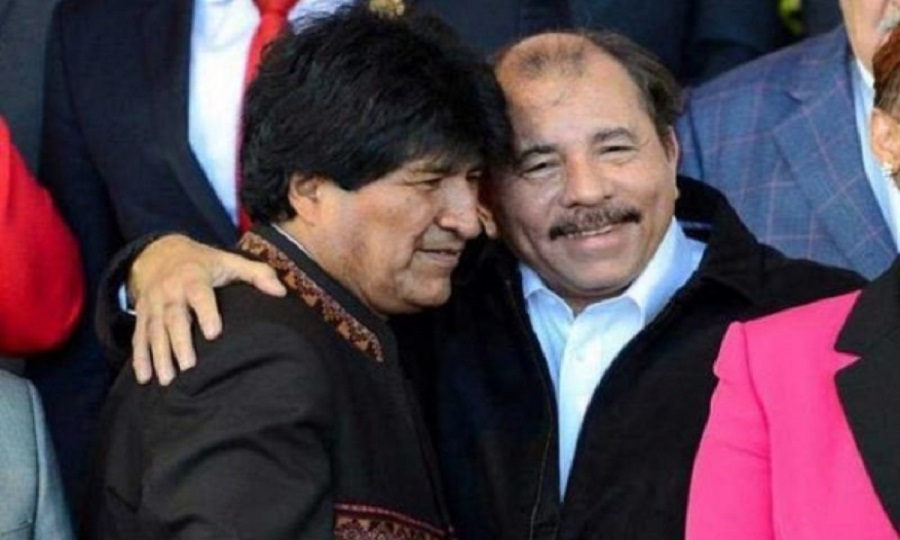By Carlos Sánchez Berzain
RIO DE JANEIRO, BRAZIL – (Opinion) Governments, democratic leaders, the international community and some media continue to describe Nicaragua and Bolivia as struggling democracies, highlighting the “electoral crisis” in Nicaragua and the “justice crisis” in Bolivia to disguise symptoms of what are in fact Cuban and Venezuelan types of dictatorships.
None of the “basic elements of democracy” survive in Bolivia and Nicaragua, these are countries with dozens of political prisoners, thousands of exiles and totalitarian rulers. They are not democracies in crisis, they are dictatorships and it is time they were described and addressed as such.

Since January 2006, with the rise of Evo Morales to the presidency, the Bolivian people were forced to walk the path of the establishment of a dictatorship that through fraud, massacres and political persecution supplanted the Republic of Bolivia and the Political Constitution to impose what is known today as a “plurinational state,” a copy of Cuban and Venezuelan dictatorial statutes that Castro-Chavism calls constitutions.
Since January 2007, with the return of Daniel Ortega to the presidency, the Nicaraguan people were forced to reestablish the Sandinista dictatorship within the parameters of 21st century socialism to convert it – like Cuba, Venezuela and Bolivia – into an “electoral dictatorship,” in which “the people vote but do not elect,” through successive constitutional amendments and laws combined with the structure of power and impunity that Sandinismo has maintained since 1990.
In both cases the “Iter criminis” or criminal path to the imposition of dictatorships had as its main players opponents who, negotiating their fears, crimes and power spaces, surrendered their countries’ institutions in exchange for pardons, amnesties, perks and interests. Great traitors to the homeland who remain as “active opponents,” lending the appearance of democracy to dictatorships, while democratic leaders were prosecuted, imprisoned and exiled, victims of “reputational assassination.”
In neither Bolivia nor Nicaragua is there any “respect for human rights and fundamental freedoms.” Nicaragua has over 130 and Bolivia over 45 political prisoners. Nicaragua’s recent political prisoners are all presidential hopefuls such as Cristiana Chamorro and others who would take part in next November 7 elections, and in Bolivia political prisoners include former president Jeanine Añez, ex-ministers, military, police, youths and citizens who were part of or victims of the failed attempt to end the leftist dictatorship between October 2019 and October 2020.
Neither in Nicaragua nor in Bolivia is the “rule of law” in force because through constitutional provisions and infamous legislation violating human rights: the law is the will of the dictator and the regime, as in Cuba and Venezuela, with “gag” laws, “retroactive” laws, laws to “fight corruption,” or “protection of sovereignty,” or simply “anti-imperialist” laws.
In both Bolivia and Nicaragua the justice system has been converted into an instrument of political persecution and the imposition of terror on the population. The “prosecutors and judges are executioners and proceedings are lynchings.” The “judicialization of political persecution and repression” has been institutionalized as a Castro-Chavist method and is the clearest evidence of the absence of “separation and independence of the public power bodies.”
With no respect for human rights or fundamental freedoms, without the rule of law and without separation and independence of public powers, but with the opposite, Bolivia and Nicaragua cannot have, have not had in the past 15 years and will not have “free and fair elections based on universal and confidential suffrage as an expression of popular sovereignty” nor “free political organization.”
What happened in Bolivia in the October 2019 elections was criminal fraud confirmed by the OAS (Organization of American States) and the European Union among others, fraud that was repeated with the complicity of those who are now prisoners of the regime in October 2020. What happened in Nicaragua is identical and it will be repeated – with opposition candidates imprisoned – next November 7.
The difference between democracy and dictatorship is not semantics, it is about abysmal oppositions that structure two completely antagonistic forms of life and government. Dictatorial regimes as violators of human rights should be excluded from the multilateral economic system, but in order not to suffer these and other consequences they continue to pretend that Nicaragua and Bolivia are democracies in crisis, when in fact they are pure and solid dictatorships that have been in place for years.
*Carlos Sánchez Berzain is an attorney and Political Scientist, Director of the Interamerican Institute for Democracy.

